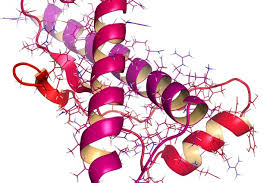By Sarah Wie
Prions are infectious agents that cause a family of progressive disorders affecting the nervous systems of humans and animals. The most notable prion disease is Creutzfeldt-Jakob disease (aka Mad Cow Disease), which is caused by eating beef products that have contaminated nervous tissue from cattle infected with the prion. The progression of the prion’s harm results in a sponge-like brain (many parts of the brain and nervous system degenerate, rendering the organism dead). These disorders are extremely infectious, as they are caused by an abnormally formed protein. There have been no treatments or vaccines for any prion disease.
Scientists and researchers have pioneered a vaccine against a prion disease, which has been proven effective against Chronic Wasting Disease (CWD), which is a disease that affects deer. CWD affects nearly 100% of North America’s captive deer population, and there is concern that this prion could spread to cattle and humans. This working vaccine established a significant scientific milestone, and further research will be conducted in order to develop a vaccine against Creutzfeldt-Jakob disease.
The prion protein, PrP, protects brain cells from injury and facilitates nerve cell communication. In a case of abnormal folding, this protein can be misfolded into a mutated form that triggers a domino effect and cases other prion proteins to also convert to abnormal form. This leads to a loss of brain tissue and many symptoms of the disease.
The CWD vaccine was developed by inserting the abnormal PrP gene into weak Salmonella bacteria within organisms, and those organisms’ immune responses produced anti-prion antibodies. The subjects were five deer, which were given the vaccine and then exposed to prion-infected brain tissue. The five deer took significantly longer to develop CWD than controlled deer (the fifth remains CWD-free). These promising results hold hope for a vaccine against prion diseases.

